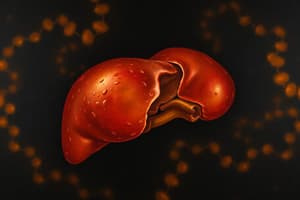Podcast
Questions and Answers
What is gluconeogenesis primarily responsible for synthesizing?
What is gluconeogenesis primarily responsible for synthesizing?
- Fatty acids from carbohydrates
- Glucose or glycogen from noncarbohydrate compounds (correct)
- Proteins from peptides
- Amino acids from glucose
Where does gluconeogenesis mainly occur in the body?
Where does gluconeogenesis mainly occur in the body?
- In the lungs and stomach
- In the liver and kidneys (correct)
- In the pancreas and small intestine
- In the heart and skeletal muscles
Which of the following is NOT a major precursor for gluconeogenesis?
Which of the following is NOT a major precursor for gluconeogenesis?
- Glucogenic amino acids
- Fructose (correct)
- Glycerol
- Lactate
Which organ is exclusively dependent on glucose for its energy supply?
Which organ is exclusively dependent on glucose for its energy supply?
What is a key role of glucose in the body during anaerobic conditions?
What is a key role of glucose in the body during anaerobic conditions?
Flashcards are hidden until you start studying
Study Notes
Gluconeogenesis Definition & Site
- Gluconeogenesis is the process of creating glucose or glycogen from non-carbohydrate sources.
- Major sources for this process include lactate, pyruvate, glucogenic amino acids, propionate, and glycerol.
- Gluconeogenesis primarily occurs in the cytosol but some precursors are made within the mitochondria.
- The liver is the main location for gluconeogenesis, with the kidneys playing a secondary role.
Importance of Gluconeogenesis
- The brain, central nervous system, erythrocytes, testes, and kidney medulla rely solely on glucose for energy needs
- Glucose is the only source for providing energy to skeletal muscle and red blood cells during anaerobic conditions.
Studying That Suits You
Use AI to generate personalized quizzes and flashcards to suit your learning preferences.



